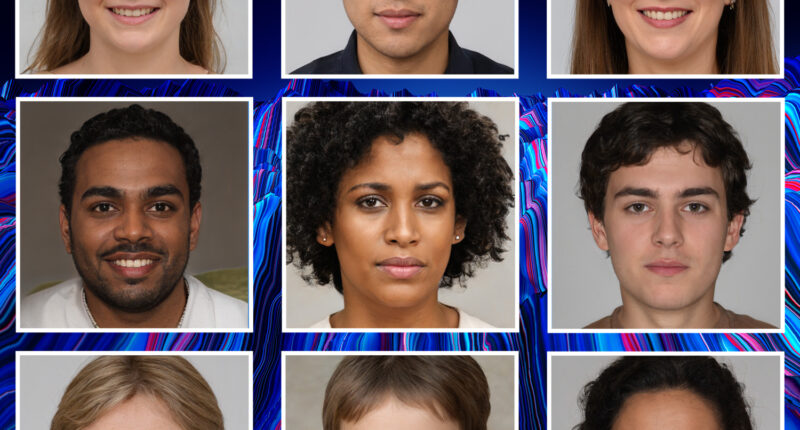DEEPFAKE AI-generated people will be among us by 2024 and will be nearly impossible to detect, a former White House official has warned.
Pictures created by artificial intelligence, increasingly smart chatbots and sophisticated deepfake videos are already becoming hard to discern from reality.
The technology is only going to become more advanced – with rapid developments already smoothing out the edges and finessing the programmes.
Red flags are already being raised – as some imagery created by AI can already be almost indistinguishable from the real thing apart from a few telltale inconsistencies.
The pictures at the top of this article are near perfect recreations of people’s faces, created using the AI driven system Generated.Photos.
These “people” have never been born – they are simply bundles of code with the illusion of personality, with varying ages, genders, facial shapes and ethnicities.


The photos are already photorealistic – complete with the imperfections that bring faces to life, far beyond what would see in video games like The Sims.
Seeing one of the faces crossing your feed on Facebook, Twitter and Instagram you would never think twice that they may be “fake”.
And perhaps one of them could even one day be your new colleague whose face pings up saying “hello” on Slack or Discord?
Cybersecurity expert Theresa Payton, the first-ever female White House Chief Information Officer, predicted a worrying new development for the future – the advent of true AI generated people.
Most read in Tech
Ms Payton described how all of these developing features of AI would combine with real data from real people to create “franken-frauds” and “AI persons“.
It is the next step in synthetic IDs which are often used to scam money from companies.
Synthetic IDs take data from real people and use it to create new identities – with the scams based around them already costing billions of pounds every year.
And in the new age of increasing remote working, these “AI persons” could end up actually entering the workforce, said Ms Payton.
“As companies automate their resume scanning processes and conduct remote interviews, fraudsters and scammers will leverage cutting-edge deep fake AI technology to create ‘clone’ workers backed up by synthetic identities,” she told The Sun Online.
“The digital walk into a natural person’s identity will be nearly impossible to deter, detect, and recover.”
She added: “The ability to create Franken-fraud or synthetic identities becomes automated and is run in real-time using AI and big data analytics to test and ensure it looks authentic.”
Ms Payton explained that companies need to prepare for this eventuality, with new hiring practices and more monitoring to ensure you actually interacting with real people.
She called for further regulation on deepfake technology and AI before the systems can truly become “indistinguishable” from the real thing.
And as well as this technology being misused by scammers, there is also another chilling possibility for the AI.
Dangerous misinformation could easily be spread online using the tech.
Where as a picture of a politician taking a bribe was once hard evidence of corruption, would you now have to stop and think whether or not this was an AI generated image?
The world has already seen some fake news spread – such a AI generated deep fake video Ukrainian president Volodymyr Zelensky telling his troops to lay down their arms last March.
Such a piece of misformation could have been devastating and sowed chaos if it ever got traction.
But thankfully, the amateur attempt at impersonating Zelensky was laughed off due to its shoddy appearance.
Ms Payton said: “The consumerization of deepfakes allows anyone with minimal technical prowess and a home computer to manipulate and generate deepfake audio and video.”
She added: “Before technology becomes indistinguishable, there needs to be greater awareness of deepfakes and their impact on the online environment.
“A group of technology companies created the Coalition for Content Provenance and Authenticity to create a standard where people could view the source of the image or video.
“Finally, technology companies need to adapt content moderation practices now to be able to identify and remove deepfake technology on their platforms.
“If these practices are not adopted, the online environment could drastically change where misinformation and manipulation campaigns are increased.”
Dr Tim Stevens, the director of the Cyber Security Research Group at King’s College London, also warned The Sun Online aboutf AI being used to spread fake news.
“We’re past the possible and into the realm of the actual,” he said.
He went on: “Tools like generative AI are already creating fake images that most people find difficult, if not impossible, to discern from real ones.
“We have detection technologies that can identify these, but these are neither widespread nor are they accurate for all time – creation and detection algorithms are already locked into a contest of evasion and identification, with fake content creators always a step in front.”
AI makes the already volatile information space even more dangerous, he warned, with trust in traditional news sources already “low”.
“These technologies in mischievous hands are likely to diminish it further,” said Dr Stevens.
“We would hope that people would seek to validate their information sources but not only is that difficult but many people don’t care: if it fits their worldview, it is already valid and not worth challenging.
“We have seen this with social media content for many years and AI is likely to make the situation much worse.”
Both Dr Stevens and Ms Payton warned hostile states like Russia and China will likely use the technology to attempt to spread discord in the West.
“Both Russia and China are explicit that their informational strategies include the objective of weakening social cohesion in target societies,” said Dr Stevens.
Ms Payton added: “Rogue actors, such as China or Russia, have used deepfakes and AI-generated images to attempt to influence the social discourse within their own countries, and outside their borders, to their own advantage.”
Tech boffins have already mastered the technique – with one AI company already whipping up pictures of imaginary people.
Midjourney’s computer programme uses machine learning and a neural network to put together pictures based on the prompts offered to it by humans – such as “women at a party.”
It then produces images like the one above which can be fantastically artistic and eerily realistic.


The controversial AI is trained by being given photos which it then draws upon to create its own images – albeit with some details of the people missing.
In one chilling snap, it is clear the women are inhuman – their skin shines too much and they have too many teeth crammed into their mouths.











